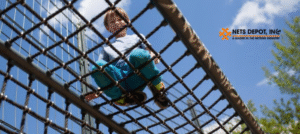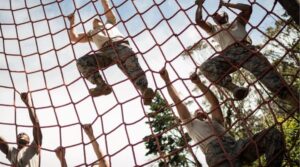Water parks are a haven of fun and excitement, offering guests a chance to enjoy thrilling rides, refreshing pools, and a wide range of attractions. However, amidst all the fun, safety is paramount. One critical safety measure that water park operators must prioritize is the installation and maintenance of water park netting. This guide will explore the importance of water park netting, the correct installation process, and the best practices for maintaining it, ensuring a safe and enjoyable experience for all visitors.
Understanding the Importance of Water Park Netting
Water park netting plays a vital role in the overall safety infrastructure of any water park. Its primary purpose is to serve as a protective barrier, preventing accidents and ensuring that visitors remain within designated safe zones. Whether it’s surrounding pools, rides, or other attractions, water park netting helps to:
● Prevent Falls: By providing a physical barrier around elevated areas or along the edges of pools, netting reduces the risk of falls, especially in areas where water or slippery surfaces are present.
● Restrict Unauthorized Access: Netting helps in managing crowd control by preventing guests from entering restricted or dangerous areas, such as maintenance zones or behind-the-scenes operational areas.
● Protect Guests from Debris: In some areas, netting can also act as a shield against debris, ensuring that leaves, branches, or other objects do not enter the water or interfere with the enjoyment of the park’s attractions.
● Enhance Overall Safety: Water park netting contributes to a safer environment by minimizing risks and ensuring that visitors can enjoy the park’s attractions without worrying about potential hazards.
Steps to Properly Install Water Park Netting
Installing water park netting requires careful planning and attention to detail. The following steps will guide you through the process to ensure a secure and effective installation.
1. Assess the Area
The first step in installing water park netting is to conduct a thorough assessment of the area. This involves:
● Identifying High-Risk Zones: Determine the areas of the water park where netting is most needed, such as around pools, slides, and elevated platforms.
● Measuring the Space: Accurately measure the height, width, and length of the areas where netting will be installed to ensure that the netting fits perfectly.
● Considering Environmental Factors: Take into account the environmental conditions, such as exposure to sunlight, proximity to water, and the presence of chemicals, which may affect the durability and performance of the netting.
2. Choose the Right Materials
Selecting the appropriate materials for your water park netting is crucial for ensuring its effectiveness and longevity. Consider the following factors:
● Durability: Opt for netting made from high-quality, durable materials that can withstand the rigors of the water park environment, including exposure to water, sun, and heavy use.
● Weather Resistance: Choose materials that are resistant to weather conditions, such as UV rays and humidity, to prevent deterioration over time.
● Strength: Ensure that the netting is strong enough to handle the force of water, wind, and the weight of any debris that may accumulate.
● Customization: Depending on the specific needs of your water park, you may need to customize the netting in terms of color, mesh size, and material type.
3. Install the Support Structures
The stability of your water park netting largely depends on the support structures you install. Follow these steps:
● Select Appropriate Support Structures: Use sturdy poles, frames, or anchors that can securely hold the netting in place. These should be made of rust-resistant materials to ensure they do not corrode over time.
● Proper Spacing: Space the support structures evenly to avoid sagging or gaps in the netting, which could compromise safety.
● Secure Anchoring: Make sure that the support structures are firmly anchored to the ground or nearby buildings to prevent them from shifting or collapsing under pressure.
4. Attach the Netting
Attaching the netting to the support structures is a critical step in the installation process. Here’s how to do it correctly:
● Unroll the Netting: Begin by unrolling the netting along the length of the area you are covering. Ensure that it is laid out smoothly, with no wrinkles or folds.
● Secure the Netting: Use heavy-duty ties, clamps, or hooks to attach the netting to the support structures. Make sure the netting is taut and evenly stretched across the area.
● Double-Check Attachments: Once the netting is in place, double-check all attachments to ensure they are secure and that the netting will not come loose over time.
5. Test the Installation
After the netting has been installed, it’s essential to test it to ensure that it provides the necessary level of protection:
● Conduct a Visual Inspection: Walk along the perimeter of the installed netting to check for any visible issues, such as loose attachments or gaps.
● Apply Pressure: Gently apply pressure to various points on the netting to ensure that it holds up under stress. If the netting gives way, adjustments may be needed.
● Make Adjustments: If any issues are identified during testing, make the necessary adjustments before the water park opens to the public.
Read it also:- How to Install a Fence Windscreen: Step-by-Step Guide
Best Practices for Maintaining Water Park Netting
Maintaining water park netting is essential for ensuring its continued effectiveness and safety. Regular maintenance helps to identify and address potential issues before they become serious problems. Follow these best practices for maintaining your water park netting:
1. Regular Inspections
Routine inspections are crucial for identifying any signs of wear and tear. During these inspections, focus on the following:
● Check for Damage: Look for any fraying, holes, or tears in the netting that could compromise its effectiveness.
● Inspect Support Structures: Ensure that the poles, frames, and anchors are in good condition and free of rust or corrosion.
● Evaluate Tension: Check that the netting remains taut and has not become loose or sagging over time.
2. Cleaning the Netting
Over time, water park netting can accumulate dirt, debris, and other contaminants. Regular cleaning is necessary to maintain its appearance and functionality:
● Use a Gentle Cleaner: Select a cleaning solution that is effective yet gentle enough not to damage the netting material.
● Rinse Thoroughly: After cleaning, rinse the netting thoroughly with water to remove any soap residue that could attract more dirt.
● Dry Properly: Allow the netting to dry completely before reinstallation to prevent mold or mildew growth.
3. Repairs and Replacements
Promptly addressing any damage to the netting is critical for maintaining safety:
● Patch Small Holes: For minor damage, such as small holes or tears, patch the affected area with similar material to restore the integrity of the netting.
● Replace Severely Damaged Sections: If the netting is beyond repair. Replace the damaged sections entirely to ensure continued protection.
● Keep Spare Parts on Hand: It’s a good idea to keep spare materials and tools on hand for quick repairs, minimizing downtime.
4. Seasonal Maintenance
In areas with seasonal weather changes, additional maintenance may be required:
● Off-Season Storage: If your water park closes during certain months, consider taking down and storing the netting to protect it from harsh winter conditions.
● Pre-Season Inspection: Before reopening, conduct a thorough inspection of the netting and support structures to identify any damage that may have occurred during storage.
● Reinstallation: Reinstall the netting following the same careful installation steps to ensure that it is secure and ready for use.
Benefits of Proper Installation and Maintenance
Investing in the proper installation and regular maintenance of water park netting offers numerous benefits that contribute to the overall success of your water park:
● Enhanced Safety: Well-maintained netting significantly reduces the risk of accidents, providing a safer environment for guests and employees alike.
● Longer Lifespan: Regular maintenance prolongs the life of the netting. Ensuring that it remains effective for many years and reducing the need for frequent replacements.
● Cost Savings: By preventing accidents and minimizing the need for emergency repairs. Proper installation and maintenance can lead to significant cost savings over time.
● Compliance with Regulations: Keeping your water park netting in good condition helps ensure compliance with industry safety regulations. Avoiding potential fines or legal issues.
Conclusion
Water park netting is an essential component of a comprehensive safety strategy. Providing protection against falls, unauthorized access, and other potential hazards. Proper installation and diligent maintenance are key to ensuring that the netting performs its intended function effectively. By following the steps outlined in this guide.You can ensure that your water park netting is installed correctly and maintained to the highest standards. Offering peace of mind to both you and your guests.
For expert advice, high-quality netting products, or assistance with your installation, don’t hesitate to reach out to Nets Depot Inc.
Contact Us:
Our team at Nets Depot Inc is dedicated to providing top-notch water park netting solutions tailored specifically to your needs. Whether you’re looking for enhanced safety. Improved aesthetics, or durable protection, we offer a range of customized netting options to meet your unique requirements. With a focus on quality and customer satisfaction. We ensure that our products are not only reliable but also designed to blend seamlessly with your water park environment. Contact us today at info@netdepot.com or call us at (305) 215-5579 to learn more about how we can help safeguard your water park with the best netting solutions available.






